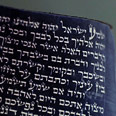
Illustration
Photo: Yisrael Bardugo
Parashat R’eih is the third largest parasha in terms of the number of mitzvoth it contains – 55. The most exceptional of these mitzvot is clearly to be found in chapter 13, verse 1: “Be careful to observe only that which I enjoin upon you: neither add to it nor take away from it.”
Actually, the verse comprises two of the 613 mitzvoth: Mitzvah 454 – not to add to any of the mitzvoth or their interpretations, and 455 – not to detract from any of the mitzvoth or their interpretations. These two mitzvoth are referred to as “bal tosif” (not adding).
Interestingly, although Maimonides and the Sefer HaHinuch attribute the two mitzvoth to this verse, the prohibition already appears in chapter 4, verse 2: “You shall not add anything to what I command you or take anything away from it, but keep the commandments of the Lord your God that I enjoin upon you.”
The purpose of these mitzvoth and their scope raised questions early on. If the purpose was truly to prohibit change, then we encounter a problem in justifying post-Torah practices such as Purim and Hanukkah, and various regulations, edicts and rules of the Sages. Indeed, early on (e.g. Rosh HaShana 28b) we also find various references to a variety of reasons for limiting the scope of bal tosif.
Rashi, for example, refers to the issue quite specifically, stating that it is prohibited “to play with the details of the mitzvoth – five compartments in the tefillin, five species for the lulav, four blessings in the Priestly Blessing.”
Maimonides takes a different approach: “For example, teaching that (mixing) poultry and milk is forbidden by the Torah.” He does not refer to a change in the way the mitzvah is performed (e.g. 5 tzitzit instead of 4), but rather to the way the mitzvah is classified. “Upgraiding” a rabbinic mitzvah to a toraitic mitzvah, or vice versa, is what Maimonides sees as constituting bal tosif. We are not permitted to add to the number of mitzvoth – 613 – nor to change their status, whether up or down.
Ibn Ezra and Nachmanides offer a third approach. In the words of Ibn Ezra: “Neither add: Of your own accord and think it is the work of God.” Nachmanides’ example is that we are forbidden to create new holidays. This negative approach toward “creativity” in the field of mitzvoth has been repeated by traditionalist rabbis throughout the generations to this very day, and has led to opposition to any changes or innovations, particularly in regard to the synagogue and prayer. Nevertheless, Nachmanides himself provides justification for the mitzva of reading the megillah on Purim, which was certainly added after the giving of the Torah.
Judaism has, indeed, changed and innovated, and has even added holidays when history demanded it, and justification was found in the such verses as: “You must not deviate from the verdict that they announce to you” (Deut. 17:11), and “Ask your father, he will inform you, Your elders, they will tell you” (Deut. 32:7). This may help us understand why the classifiers of the mitzvoth associated bal tosif with parashat R’eih, chapter 13, verse 1, in which the statement is presented in the singular and is directed at the individual, as opposed to the earlier verse – chapter 4, verse 2 – in which the rule is stated in the plural and is directed at the congregation. Thus we find that most of the explanations refer to the role of the individual, as do Rashi and Maimonides. The Hatam Sofer gave an interesting commentary to this verse in regard to religious extremism: “It is prohibited to increase and elevate and say that something that is not so severe is more severe … in any case, there is a great difference between custom and a Torah prohibition, in being lenient when required.”
Rabbi Simcha Bunim of Przysucha saw a psychological dimension: “When a person is not in a state of perfection, he requires stringencies and boundaries. The verse ‘you shall not add …nor take anything away’ is tied to the verse that follows: ‘while you, who held fast to the Lord your God’ (Deut. 4:4). When you hold fast to God, you do not need fences and boundaries.” According to this view, religious extremism is not a sign of strength but of weakness and insecurity.
Rabbi Daniel Goldfarb is director of the Conservative Yeshiva in Jerusalem















